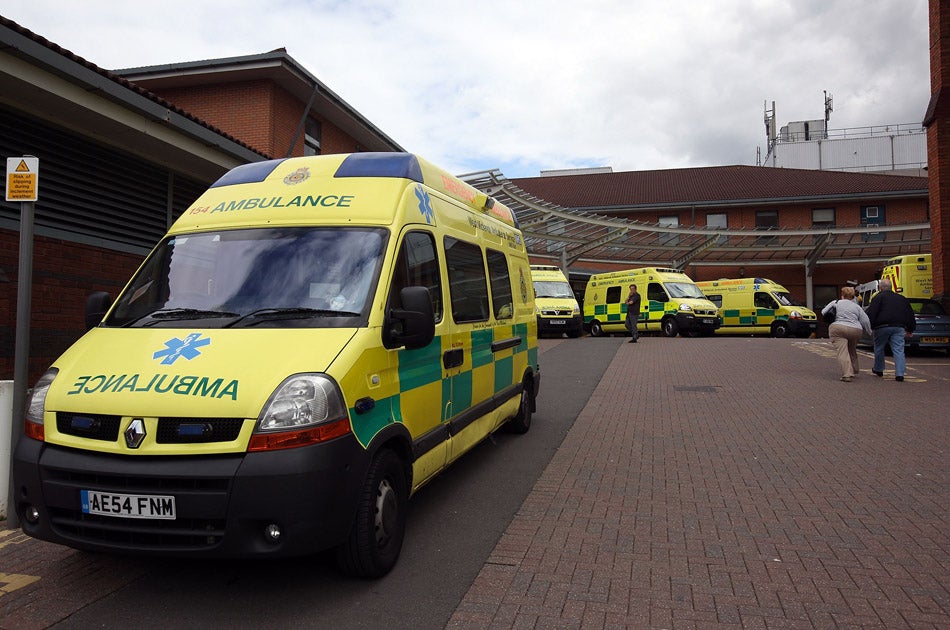
Patients needing emergency care are almost 10% more likely to die if they are admitted to NHS hospitals on weekends, according to a new report.
They are also less likely to get prompt treatment, according to the study, which paints a "worrying" picture of NHS care on weekends.
Hospitals with the fewest senior doctors on duty have the highest death rates, reflecting prior concerns about a lack of consultant cover, with junior doctors often left in charge.
The Hospital Guide, from Dr Foster Intelligence, found around one in eight trusts had higher than expected death rates on Saturdays and Sundays.
In a "handful" of trusts, the death rate rose by 20% or more at weekends.
The overall death rate for emergency admissions rose from 7.4% during the week to 8.1% at weekends, a 9.5% increase.
The report follows several studies last year which showed the risk of dying in NHS hospitals on weekends and bank holidays is higher than during the week.
Experts say one reason is a lack of consultants on weekends and holidays and a lack of specialist services, such as scans and tests.
A year ago, the Royal College of Physicians (RCP) warned that patients are being left in the hands of junior doctors because of inadequate consultant cover on weekends.
Today's report looked at death rates using four measures - deaths in hospital, deaths in hospital and within 30 days of discharge, deaths linked to low-risk conditions and deaths after surgery.
It also found problems with timing, saying patients with a broken hip have a much better chance of survival if treatment is received within two days.
But those patients admitted on a Friday or Saturday have less chance of prompt treatment, it said.
Roger Taylor, director of research at Dr Foster, said a shortage of senior doctors was at the heart of the problem.
"It's about having the more experienced staff in the hospital, looking after patients out of normal working hours.
"The junior doctors, they're always around, but they're not the ones making a difference here."
He added: It is concerning that many of the issues raised in the first Hospital Guide remain problems 10 years later."
Sir Richard Thompson, president of the RCP, said: "At last we have data that clearly links higher numbers of senior doctors in hospitals at the weekend with lower mortality rates.
"The findings of the Dr Foster report support the RCP's 2010 recommendation that any hospital admitting acutely ill patients should have a consultant physician on-site for at least 12 hours per day, seven days a week.
"No other duties should be scheduled during this time.
"In addition, all medical wards should have at least one daily visit from a consultant; in most hospitals this will involve more than one physician."
He added: "At a time when finances are tight, hospitals will see freezing the number of staff as a way to save money, but we must ensure this does not happen."
Professor Norman Williams, president of the Royal College of Surgeons (RCS), said: "The report echoes the RCS view on areas such as improving consultant-led cover at weekends, uptake of new technology and concentrating operating in high volume units where outcomes are better."
NHS Confederation deputy chief executive David Stout said that despite over a decade of sustained improvements in hospitals, some "really knotty challenges" remained.
"We see inconsistent care between hospitals and inconsistent quality over the course of a week," he said.
"A big part of the answer is to change the way we deliver services, bringing them closer to home where possible and moving them further away when they need to be in order to provide the safest and best possible care."
NHS medical director Professor Sir Bruce Keogh said: "Mortality rates in the NHS are going down, but hospitals with high rates and poor outcomes in the evenings and at weekends must investigate to see where performance may be falling short and look to those with the best rates to see how they can improve.
"I will be asking the NHS medical directors to look closely at weekend services to ensure patients admitted at weekends receive the same standards of care as those during the week."
Dr Peter Carter, chief executive of the Royal College of Nursing (RCN), said: "Due to the complex needs of many older people, having staff with the right mixture of skills and experience on the ward is vital.
"Equally, it is both risky and irresponsible to expect two nurses and four healthcare assistants to safely look after 59 elderly patients, as the report found at one hospital.
"We know that quality of care and patient safety is improved when you have enough nurses with the right skills in place on wards."
PA
Subscribe to Independent Premium to bookmark this article
Want to bookmark your favourite articles and stories to read or reference later? Start your Independent Premium subscription today.

Join our commenting forum
Join thought-provoking conversations, follow other Independent readers and see their replies